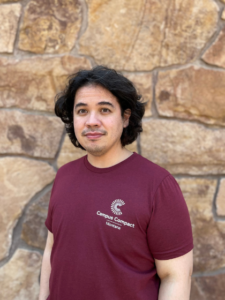The Unfrettables by David Mariani

MTCC AmeriCorps at Great Falls College MSU operates out of the Office of Student Engagement and oversees the Great Falls College MSU Food Pantry. Students are welcome to find me for food, hygiene products, and meaningful human interaction, all freely given with no strings attached. Once in a while, I throw in some words of wisdom as a bonus.
I recently had a student visit me at the food pantry with a few needs. My service always comes with a genuine concern for an individual’s wellbeing, so my trips to the pantry usually take a little while as students update me on their happenings. This particular student was about to start an unpaid internship and was having difficulties finding a job that would work with a complicated schedule. Frustrated with an economic system that was not designed to address the needs of first-generation and low-income students, my friend began to sob as a story of ages-old inequality was told to me from a perspective not unique under the big sky.
When I find myself in difficult situations, I try to keep in mind some secular Buddhist teachings that helped me get through my own struggles while at school. The Buddha’s Four Noble Truths do not deal with religion so much as explore humanity’s unique relationship with suffering. Keep in mind that I am not an expert in anything and simply took numerous detours into philosophy, theology, communications, and art while studying English at a Catholic university.

- Dukkha: Suffering exists: Life is suffering. For my friend, suffering most definitely existed then and continued after meeting with me. Tears are a physical manifestation of suffering. Acknowledging discontentment, hurt, and pain in oneself is important for personal growth and essential for empathizing with others. A positive to acknowledging this is that you know you are still alive if you are experiencing suffering.
- Samudaya: Suffering has a source. Suffering is due to wanting. This is a confusing point for many who are unfamiliar with the concept. Wanting on this level involves unattainable things—wanting to be of a different social status or class, wanting to be of a different ethnicity, wanting to be of a different sexual orientation, and so on. What I heard from my friend was a desire to contribute to familial financial needs, to perform well with studies and earn good grades, and to have a successful internship leading into a career. While these wants should be simple and achievable goals, they are each a “can’t” mistaken by our society as a “won’t”.
- Nirodha: An end to suffering is possible. Suffering ceases when we stop wanting things we cannot have. In this part of the discussion is where people often become flippant. Make sure to exercise some patience for yourself or for the person you are listening to because change is difficult. Unpaid internships for my friend and other students around the nation do not allow for paid work, they do not allow for success for anyone other than those privileged few who have families to pay for their lifestyles. Whatever the situation entails, practice charity and compassion for the person going through a difficult moment. Stop fretting over things you have no control over, things you cannot do anything about.
- Magga: To end suffering, follow the Eightfold Path. The Eightfold Path is a lifestyle guide with moderate suggestions that are simply pieces of good advice. Purposely educate yourself, be mindful of yourself and others, avoid keggers because nothing good ever comes from a bunch of people destroying their livers/kidneys while lying and gossiping about each other, and that sort of thing. Purposefully live your life. Do good. Simple.

Reaching out to all those in need, those trying but not progressing, and those who are just a bit lost because they have every right to be given the circumstances of our world nowadays does not actually take much effort.
The students who spend time with me need respect and dignity because everyone needs these things, everyone needs to be treated humanely. A need is different from a want. We all need to feel heard and to have our suffering acknowledged.
If you are in need, please find someone who can help.
Service includes more than just your wants being fulfilled. The world needs us. This is why I serve.
 Blog
Blog